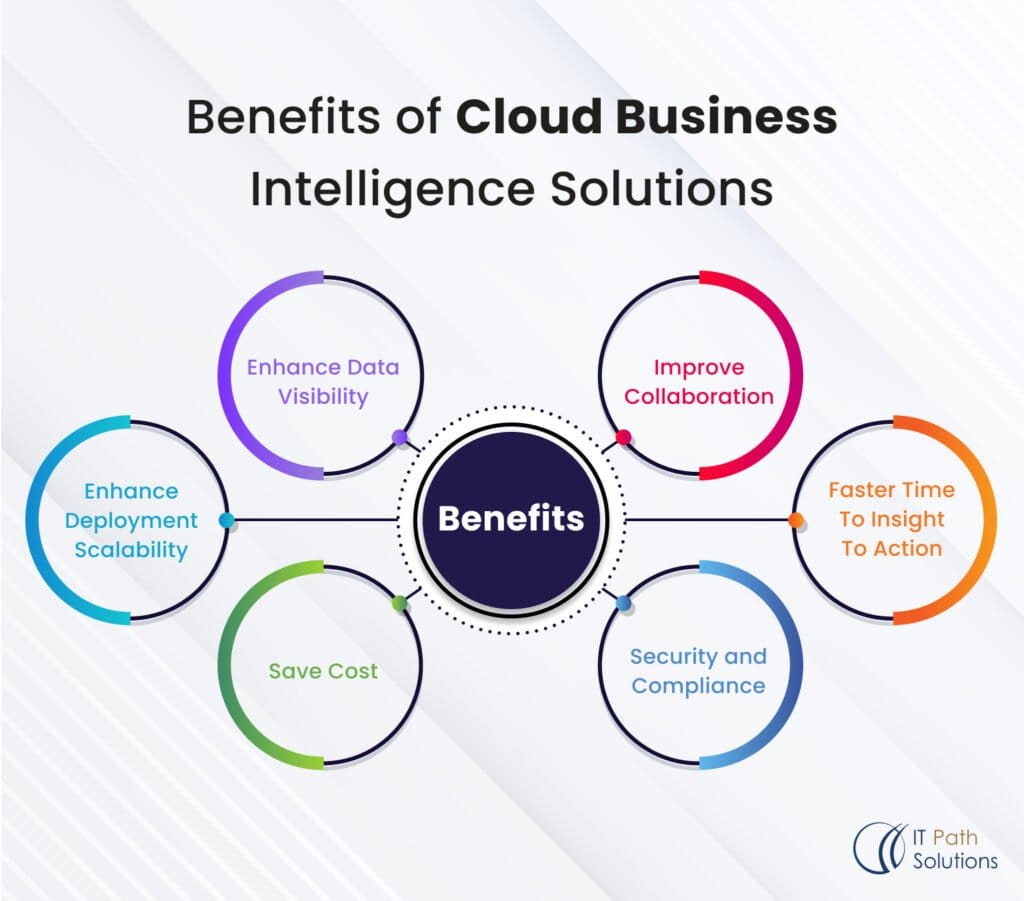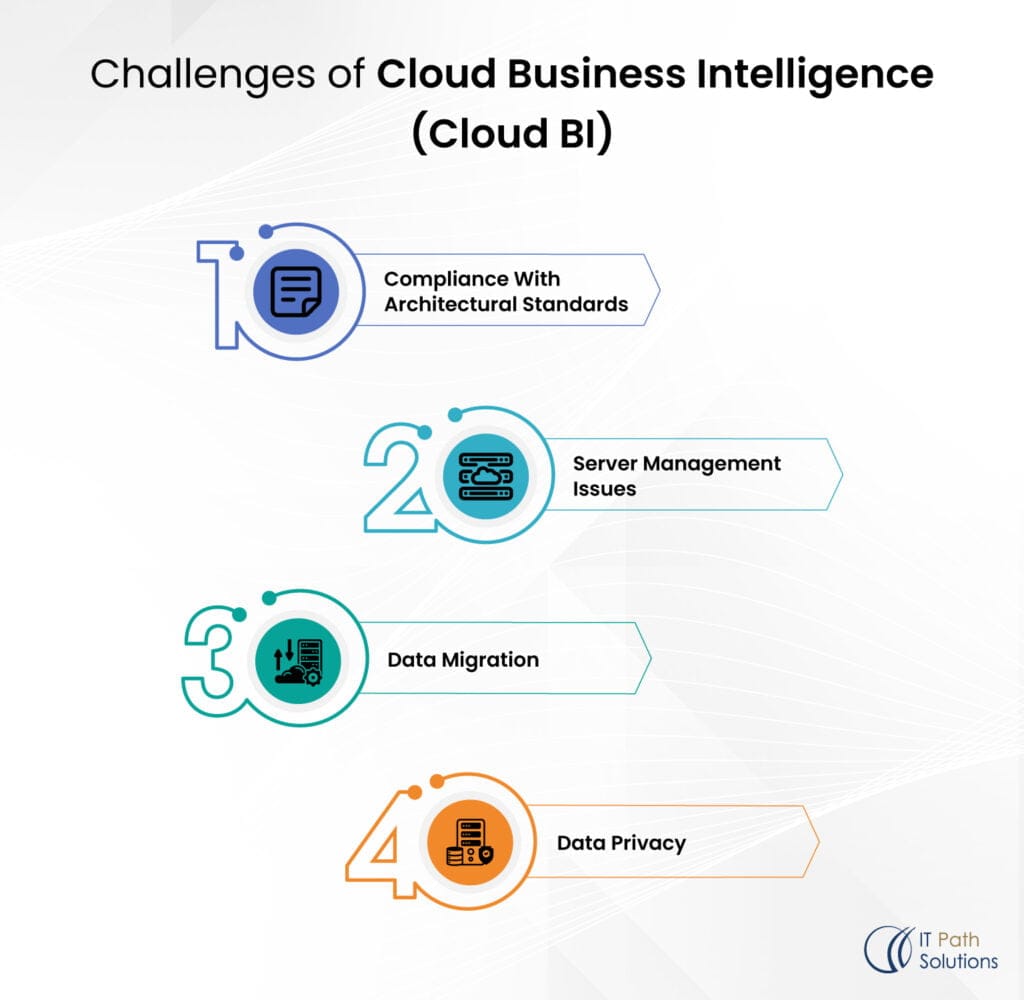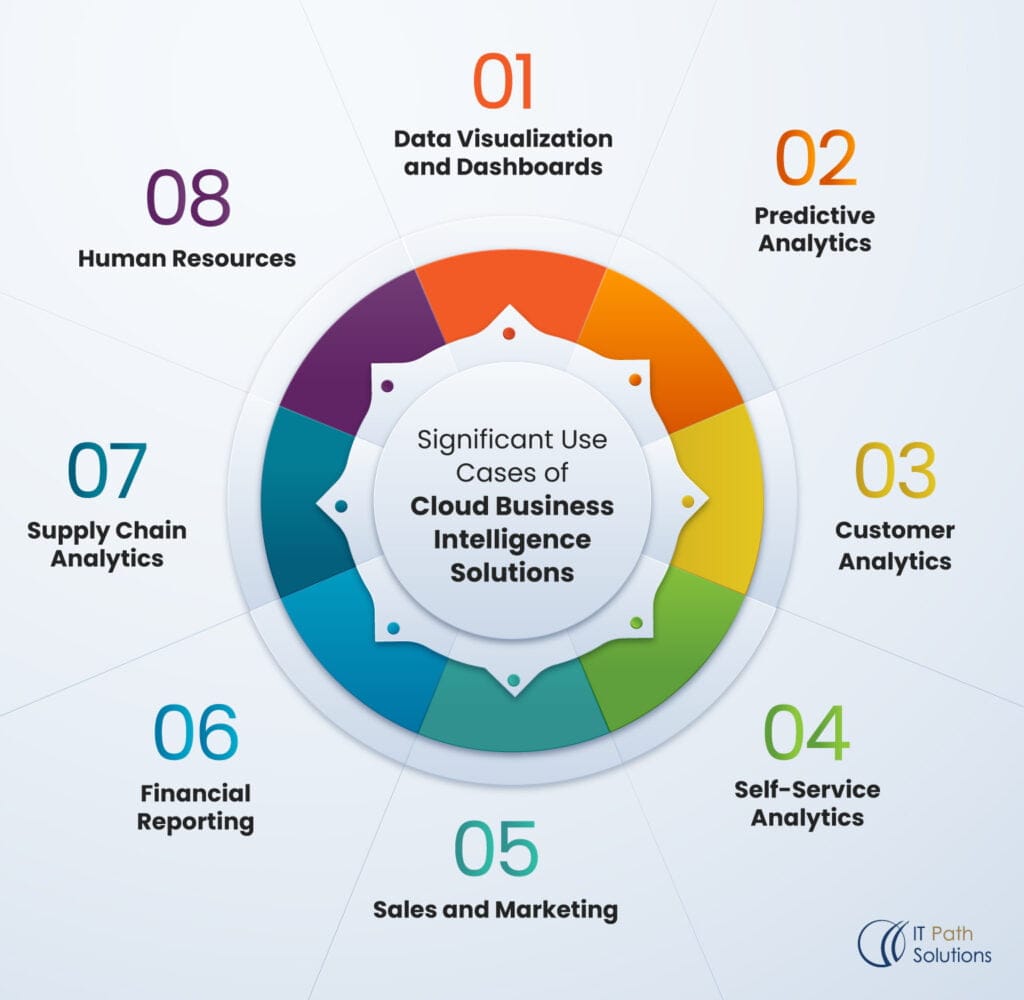Cloud Business Intelligence: Ultimate Guide On Cloud BI Vs Traditional BI
Keyur Patel
September 12, 2025
13 min
Cloud Business Intelligence (Cloud BI) is a modern process that involves connecting and analyzing data from the cloud to gain valuable insight for decision making. Organizations can extract meaningful patterns and identify future trends by connecting various data sources such as customer information, sales data and financial information. Cloud BI Solutions offer valuable insights that enable users to take automatic actions based on those insights.
Cloud-based business intelligence solutions make business data more accessible than ever before, their user-friendly design, rapid deployment, scalability, and accessibility make them ideal for organizations looking for faster and more efficient methods to analyze and visualize data.
Cloud business intelligence tools use a variety of advanced methods to collect, organize, switch and transform data. Cloud BI tools connect to existing data sources such as databases and spreadsheets and then data processed with diverse methods using algorithms and statistical models. This data is ready to be analyzed to identify insights by cloud business intelligence. These insights can be presented in data visualizations, such as bar charts or histograms, shared with other users, and used to inform decisions that drive business performance.
Let’s look at how cloud business intelligence can boost your team’s insight and enhance overall business performance.
Benefits of Cloud Business Intelligence
A cloud business intelligence solution (Cloud BI) offers several benefits where cloud businesses can gain insight into their operation and performance quickly. Here are the key advantages:

-
Enhance Data Visibility
Organizations have struggled with countless data sources in the past, where information from various systems remain separate. By migrating data to the cloud, these obstacles are overcome, resulting in a more comprehensive and integrated understanding of the organization.
A strong Cloud-based BI solution can connect directly into the cloud environment, and let the organization analyze current data from many sources and enhance the decision making progress.
-
Improve Collaboration
Cloud business intelligence solutions enable a seamless collaboration process by sharing real-time data insights. Team members can connect to the same data set, enabling more accurate analysis and making it easier to find areas for improvement..
-
Save Cost
Adopting a Cloud Business Intelligence (BI) solution significantly reduces costs for organizations. Unlike traditional on-premises systems that require cost, time, and resources. Cloud bi maintain scalability of cost that allows organizations to only pay for the resources they use, optimizing operational costs.
-
Faster time to insight to action
With Cloud BI solutions, organizations can achieve faster time to insight to make decisions by automatic data processing and analysis. Cloud BI eliminates the need for manual data processing and reduces the time it takes to gain valuable insights.This cycle helps organizations to respond quickly for changing market conditions, customer needs, and other business factors.
-
Enhance Deployment Scalability
Cloud Business Intelligence solutions greatly enhance deployment scalability so organizations can easily expand their data processing and analysis capabilities as needed. This scalability helps businesses to efficiently manage their resources, optimize performance, and maintain agility in a dynamic market environment.
-
Enhance Security and Compliance
Cloud BI has a solid foundation for security, keeping up with constantly evolving regulation. Cloud business intelligence offers robust advanced security measures such as encryption, identity access management and threat detection. It helps organizations to maintain compliance policy with industry standards and regulations.
Challenges of Cloud Business Intelligence
When it comes to hosting business intelligence on cloud, there are a few hurdles to consider.

-
Compliance with Architectural Standards
It can be a complex task to ensure that Cloud BI solutions comply with existing architectural standards. Enterprises often have existing IT environments and methods, which must be incorporated into new cloud environments. While there is a need to achieve integration in the manipulation of the two aspects, there is also a need to ensure consistency and performance that is why achieving it needs proper planning and coordination. Any variation from architectural patterns will result in complications, complexity and general sub-optimality of managing IT infrastructures.
-
Server Management Issues
While cloud providers handle large amounts of data and maintain consistent response time, organizations still face challenges related to server configuration, optimizing and monitoring. It can be a challenging task to ensure that servers are properly configured to handle specific workload and performance requirements. Moreover, organizations should monitor server performance to avoid downtime issues and ensure that BI applications run smoothly on server.
-
Data Migration
It can be a challenging task for an organization to ensure that the data is accurately and securely transferred without loss or corruption. This process often involves dealing with large volumes of data, which can be time consuming and resource-intensive.
-
Data Privacy
Data privacy is a major concern for organizations when using Cloud BI Solutions. Organizations should ensure that sensitive data is protected against unauthorized access, and this process often involves implementing robust encryption, access controls, and compliance with data protection regulations such as GDPR or CCPA.
Also Read: From Spreadsheets to Data Visualizations: Build an Interactive Financial Dashboard with Power BI
Cloud BI vs. Traditional BI
Here are the difference between traditional Business intelligence and cloud BI and you can choose best solutions for your company needs:
-
Cost Efficiency:
Cloud business intelligence platforms are generally more affordable than traditional BI Solutions. Cloud BI operates a subscription based model where organizations can pay only for what they use resources. With Cloud BI small businesses can enjoy lower upfront costs. It also reduces or removes expenses related to ongoing hardware and software maintenance and updates. Moreover Cloud BI helps business owners to reduce the need of a large inhouse IT Team to manage and support the system.
Unlike traditional BI often involves initial investments in hardware, software license and infrastructure. When it comes to scalability, traditional BI can be costly and complex, it often requires additional hardware purchases and extended implementation times.
-
Ease of Use:
Cloud BI offers a user-friendly design platform, intuitive interface and dashboard so non-technical professionals can easily use it. It provides various functionality such as drag-drop, pre-built template, easy to navigate and report tools. It enables users to generate beautiful data visualization and valuable insight without training.
While traditional BI can be complex and requires specialized knowledge to operate effectively. They often involve setup processes, learning curves, and necessary training for users.
-
Deployment Speed:
Cloud BI applications are very simple and rapidly to deploy since there is no need for additional hardware and software installations. This rapid deployment allows businesses to start leveraging data insights almost immediately. This way your organization becomes able to respond to market change and internal demand quickly.
While traditional BI is a lengthy and complex process to deploy, it may take several months to a year. They require installing hardware, configuring software, and integrating with existing data sources.
-
Scalability
Cloud BI platforms have key strengths of scalability and elasticity. Cloud BI Solutions can easily scale up and down based on your business needs. As a result you get more flexibility than traditional business intelligence, such as handling increasing data volume and user demands without significant additional costs. While traditional BI is more labor-intensive to scale and often requires large investments in hardware and software installation.
Cloud BI vs. Traditional BI: An In-Depth Comparison
Let’s have look at in-depth comparison between Cloud BI and Traditional BI in table view:
| Feature | Cloud BI | Traditional BI |
|---|---|---|
| Deployment | A version of computing where the user, instead of storing programs and data on their personal computer or local server, uses a cloud provider’s server remotely. It is designed to be used in a web browser on a computer and a mobile application for smart mobile devices. | Deployed and sustained in the premises of the organization through having fixed locations and tangibility. |
| Cost Efficiency | Pay-as-you-go model: Subscription fees are typically based on usage (number of users, data volume, etc.). Lower upfront costs as hardware and some software expenses are eliminated. | High upfront costs: Requires investment in hardware, software licenses, and potentially additional IT staff for setup, maintenance, and ongoing support. |
| Ease of Use | User-friendly interface: Designed for business users with varying technical skill sets. It often offers self-service capabilities for data exploration and report creation. | Requires IT expertise: Setup, configuration, report generation, and data manipulation often require dedicated IT staff with specific knowledge of the BI tool. |
| Deployment Speed | Quick and easy setup: Minimal IT involvement needed. Users can be up and running in a short time frame. | Lengthy and complex: Can take weeks or months to set up and configure the hardware, software, and data integration. Requires dedicated IT resources. |
| Scalability | Automatic scaling: Cloud infrastructures have the flexibility for large volumes of data and the number of users or when there is a very high rate of usage; the resources can be scaled. | Manual upgrades required: Additional investment in equipment or software is needed for new data volumes or for supporting growth in the number of users. When exploring the EI options available, the process can take a considerable amount of time and entail substantial costs. |
| Data Security | Robust security measures: Security is a key priority for cloud providers, and they spend billions of dollars on security and employ multiple security solutions such as encryption and access controls to protect the cloud data. Nevertheless, concerns may be made by some organizations that involve off-site storage of data since it is vulnerable to threats. | Complete control over data security: Physical like data is internal to the organization’s infrastructure and thereby offers a more measured feel. However, commenting and enhancing the security solution which defenses the organization’s interests need time and qualified IT staff.. |
| Accessibility | Accessible from anywhere: Since users can connect to InterWeave through web browsers, they can access data and reports from anywhere they have access to the Internet. | Limited accessibility: Normally it is used to enforce users to connect on the organization’s network or those who log in remotely through a VPN. |
| Integration | Seamless integration: Most of the Cloud BI platforms have been designed to work well with other Cloud applications such as customer relation management, enterprise resource planning, and marketing automation. | Additional effort for integration: Traditional BI may need to be developed perhaps with middleware or enhanced to integrate with other systems on-premise. |
| Updates & Maintenance | Automatic updates: Several experts noted that with clouds, updates and maintenance of software is the responsibility of the cloud providers, lessening the load on IT. | Manual updates: Requires manual updates and maintenance of hardware and software by the organization’s IT staff. |
| Disaster Recovery | Built-in disaster recovery: Cloud providers have robust disaster recovery plans in place to ensure data availability in case of outages. | Requires additional planning: There is a note that organizations have to assure comprehensive disaster recovery for on-premise data assets and infrastructure arrangements. |
Also Read:- Integrating Power BI in Your Custom SaaS Product
Significant Use Cases of Cloud Business Intelligence
To better understand why us Cloud business intelligence solutions is becoming more widely popular, let’s look the most common use cases:

-
Data Visualization and Dashboards
Cloud business intelligence solutions allow organizations to create interactive and visually appealing dashboards and reports. By implementation of Cloud BI tools, users can easily track key performance indicators(KPI) and gain valuable data insight into their company performance.
-
Predictive Analytics
Cloud BI can leverage machine learning and predictive analytic models to forecast potential trends, identify patterns and make data driven predictions about the future business outcomes. These capabilities help businesses to demand forecasting, risk management and custom behavior analysis.
-
Customer Analytics
Cloud-based bi solutions enable organizations to gain deeper insights into their customers and better understand their needs. Specifically Large or Small enterprises can use cloud-based business intelligence solutions to customer segments, analyze their behavior and personalized their product based on these insights.
-
Self Services Analytics
Cloud BI enables non-technical professionals to perform advanced self services analytics and create their own report without replying to their IT team.
-
Sales and Marketing
Organizations can use Cloud business intelligence solutions to analyze sales data, track performance of marketing campaigns and measure effectiveness of their marketing channels. This capability enable them to better optimize their sales and Marketing strategy.
-
Financial Reporting
Finance firms can use cloud business intelligence to enhance their financial performance such as defining budget, financial planning, and real-time financial reporting.
-
Supply Chain Analytics
Cloud business intelligence solutions can help logistic industry or supply chain professionals to optimize their operations by providing insights into inventory management, demand forecasting, supplier performance and logistics.
-
Human Resources
Cloud BI solutions enable the human resource department to analyze employee data, track workforce trends, and enhance talent management. This includes conducting employee retention analysis, performance reviews, and workforce planning.
How To Choose The Right Cloud BI Solution For Your Business
Choosing the right Cloud BI Solutions partner can enable your organizations to gain valuable insights and better informed decision makers if needed. Here are some factor to consider:
-
Identify your business needs
In this beginning phase, understand your specific business needs. Identify the scale of your business intelligence data and the level of details you require in your insights. Hire Power BI Consultant from Us that will help you to choose the ideal Cloud BI Solutions that can cater your demand and business goals.
-
Evaluate integration capabilities
Your Cloud BI provider should have capabilities that how well the cloud BI solution integrates with your existing data sources, systems, and infrastructure. Look for Cloud BI solutions that offer pre-built connectors and seamless data integration.
-
Assess the scalability
Choose Cloud BI Solutions that can scale with your business to accommodate your growing data and user needs. Cloud BI Solutions should be flexible and can scale up and down based on your changing requirements.
IT Path Solutions ensures scalability without concern, they offer best Cloud-based BI solutions to grow your business by allowing you to add more data source, dashboard and users as needed.
-
Customization and user-friendliness
Cloud BI tools should offer customized dashboard and reports where you can tailor analytic to your specific business needs. Opt for an ideal solution that provides an intuitive interface and self-service capabilities for your business users.
-
Pricing Model
Evaluate the different Power BI pricing model of the cloud BI solution, make sure that cost aligns with your budget and provides the best value for your organization. IT Path Solutions offers a flexible pricing model for small-to-medium size enterprises looking to invest in reliable Cloud BI and Power BI solutions.
Are you ready to take your business to the next level?
Cloud Business Intelligence is a modern way to access and analyze data that can provide several benefits and significant use cases for businesses of all sizes. If you are looking for a way to improve the decision making process for your business, give IT Path Solutions a try. With our Power BI consultant, you will be able to handle large volumes of insights, data visualization and generate reports in your own organization. Get A Quote and See how IT Path Solutions can help you to make better decisions for your small-to-medium enterprises.

Keyur Patel
Co-Founder
Keyur Patel is the director at IT Path Solutions, where he helps businesses develop scalable applications. With his extensive experience and visionary approach, he leads the team to create futuristic solutions. Keyur Patel has exceptional leadership skills and technical expertise in Node.js, .Net, React.js, AI/ML, and PHP frameworks. His dedication to driving digital transformation makes him an invaluable asset to the company.
Related Blog Posts

What Is Minimal Viable Product Development?
Do you want your MVP to grab eyeballs and become the next big thing? Do you have a one-of-its-kind billion-dollar idea in mind? If yes, MVP development is for you! No application can directly grab millions of downloads overnight without validating an MVP. The success stories of Facebook, Twitter, Dropbox, Airbnb, Uber, and many more… What Is Minimal Viable Product Development?

Mobile Business Intelligence: Comprehensive Guide & Key Insights
The growing reliance on mobile devices has revolutionized how businesses function. Today, decision-makers expect real-time access to business-critical information—anytime and anywhere. Mobile Business Intelligence (Mobile BI) bridges this gap, combining the power of traditional BI tools with the convenience of mobility, transforming how organizations analyze, share, and act on data. This guide delves into Mobile… Mobile Business Intelligence: Comprehensive Guide & Key Insights

Business Intelligence Features, Benefits, and Solutions You Need to Know
“Unlock the secrets to smarter decision-making with business intelligence! Discover how transforming raw data into actionable insights can boost your sales, enhance customer experiences, and optimize supply chains. Ready to revolutionize your business?” In today’s fast-paced business environment, organizations are inundated with vast amounts of data generated from various sources. Many companies struggle to harness… Business Intelligence Features, Benefits, and Solutions You Need to Know


